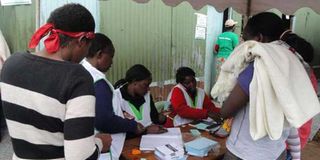Call for more access to family planning services as world marks contraceptives day

Health workers attend to women during a family planning forum in Kangemi, Nairobi. Nearly four million unintended pregnancies can be prevented in the country if women who need family planning get access to contraceptives. FILE PHOTO | NATION MEDIA GROUP
What you need to know:
- This is according to fourth edition of the Family Planning Saves Lives report by the Population Reference Bureau.
- According to the 2014 Kenya Demographic Health Survey (KDHS), at least 18 per cent of married women have an unmet need for family planning.
- Family planning methods such as condoms, help prevent the transmission of HIV and other sexually transmitted infections.
Nearly four million unintended pregnancies can be prevented in the country if women who need family planning get access to contraceptives such as condoms, oral contraceptives, implants and intrauterine devices (IUDs), among others.
This unmet need for family planning is currently at 23 per cent.
Two in ten women would like to delay or stop childbearing but are not using any methods of contraception.
This need for family planning is especially high among groups such as adolescents, migrants, urban slum dwellers, refugees, and women in the postpartum period (those who have just delivered).
This is according to fourth edition of the Family Planning Saves Lives report by the Population Reference Bureau.
Globally, an estimated 225 million women in developing countries would like to delay or stop childbearing but are not using any method of contraception.
UNMET NEED
According to the 2014 Kenya Demographic Health Survey (KDHS), at least 18 per cent of married women have an unmet need for family planning.
Adolescent girls and young women living with HIV, specifically, face stigma and discrimination when they seek reproductive health services such as family planning.
This is despite the fact that HIV prevalence in youth who are 15 years old is similar for both boys and girls, but almost 4 times higher in young women by the age of 24.
This is made worse by the community perception that the unmarried youth should not be sexually active and therefore should not have access to reproductive health services, according to Dr George Kamau, the Country Director for Deutsche Stiftung Weltbevoelkerung (an international health advocacy organisation).
In addition to spacing families, some family planning methods, such as condoms, help prevent the transmission of HIV and other sexually transmitted infections.
As a result, the World Health Organisation is calling on countries to ensure access to preferred contraceptive methods for women and couples as the World Contraception Day is marked Monday.





